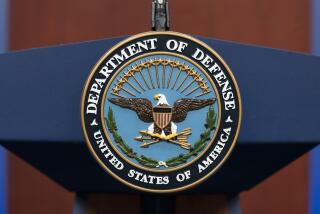FDA OKs Army Use of Experimental Drugs on Battlefield
- Share via
WASHINGTON — The Food and Drug Administration says Army doctors in the Persian Gulf need not obtain patient consent before using experimental drugs on the battlefield, particularly in the event of chemical or biological warfare.
The new rule was signed Friday by Health and Human Services Secretary Louis W. Sullivan and Deputy FDA Commissioner James S. Benson. It grants Defense Department requests to waive patient consent in using “investigational new drugs” in “certain battlefield or combat-related situations.”
“Combat-related” might mean only the threat of combat, the regulation said.
Armed forces doctors, like civilian physicians, normally must get informed consent before using such drugs. But the Pentagon, in an Oct. 30 letter to the FDA requesting the waiver, said that “military combat is different.”
“If a soldier’s life will be endangered by nerve gas, for example, it is not acceptable from a military standpoint to defer to whatever might be the soldier’s personal preference concerning a preventive or therapeutic treatment that might save his life, avoid endangerment of the other personnel in his unit and accomplish the combat mission,” the letter said.
Investigational new drugs are those that have emerged from formal clinical trials, and are being used by physicians who promise to report results, but have not yet been granted full FDA approval.
Dr. Sidney M. Wolfe, director of the Public Citizen Health Research Group, said Saturday that the new regulation is “an outrage” because it tells soldiers in the field that they “are going to become guinea pigs for drugs not proven to be safe and effective.”
More to Read
Sign up for Essential California
The most important California stories and recommendations in your inbox every morning.
You may occasionally receive promotional content from the Los Angeles Times.













